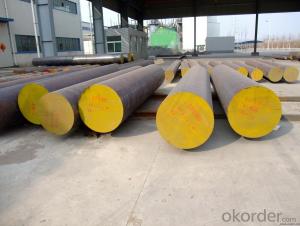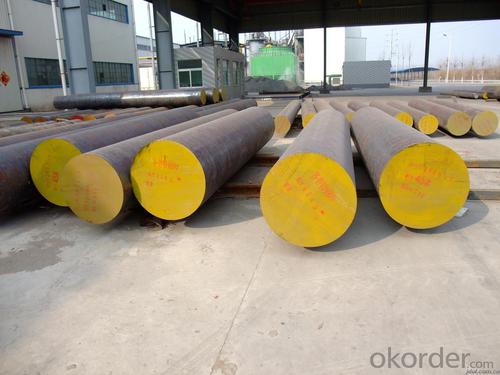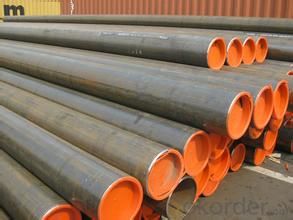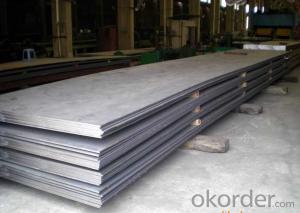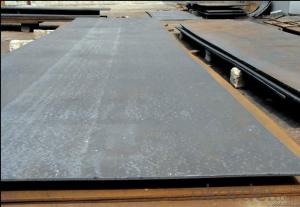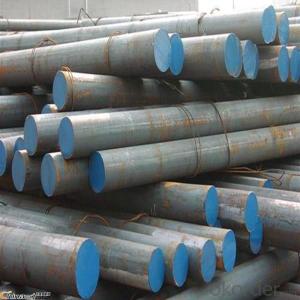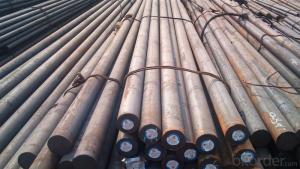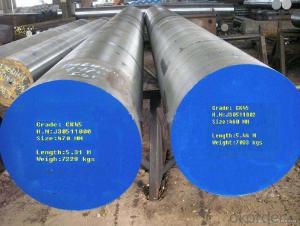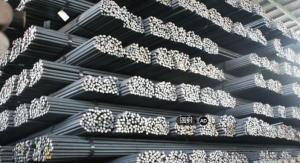Special Steel Cr12 D3 DIN1.2080 SKD1 Round Steel
- Loading Port:
- China main port
- Payment Terms:
- TT OR LC
- Min Order Qty:
- 30 m.t.
- Supply Capability:
- 10000 m.t./month
OKorder Service Pledge
OKorder Financial Service
You Might Also Like
Specification
Special Steel Cr12 D3 DIN1.2080 SKD1 Round Steel
Product Information:
1.Surface condition:Black surface / Grinding / Polishing / Milling / Machined……
2.Hardness:Annealing hardness: HBS=217~269
3.Delivery condition:Hot rolled/Black/ Hardened & tempering/EAF or ESR material
4.Size specification
Thickness: 20~300MM
Width: 205~610MM
Length: 2000~5800MM
Round bar size: 60~300MM
And we can also provide the size as you required.
5.Payment terms:Prepay 30% deposit, T/T or L/C at sight.
6.Material character:
High preferably quenching
Good wearable
Ledeburitic steel
7.Application:It can be used for making small impact and high quality wear cold-punching mould. Such as stretch form mould and punching mould.
Product Overviews:
| Product Name | Typical Grades | Diameter(mm) | Standard adopted |
| Carbon Steel | 20 (1020/S20C/C22) | Ø16-Ø300 | GB/SAE/JIS/DIN |
| 40 (1040/S40C/C40) | |||
| 45 (1045/S45C/C45) | |||
| Bearing Steel | GCr9 (51100/SUJ1) | Ø12-Ø250 | |
| GCr15 (52100/SUJ2/100Gr6) | |||
| GCr9SiMn (A485-Gr.1/SUJ3) | |||
| Cr-Mo Steel | 20Cr (5120/SCr420H/20Cr4) | Ø12-Ø250 | |
| 40Cr (5140/SCr440/41Cr4) | |||
| 42CrMo(4140/SCM440/42CrMo4) | |||
| Gear Steel | 20CrNiMo | Ø16-Ø600 | |
| 20CrMn(5115/SMnC420/20MnCr5) | |||
| 20CrNiMo(8620/SNCM220/20CrMiMo2) |
Product Show:

Our Advantages:
· Industry experience over 20 years.
· Shipment of goods -More than 70 countries worldwide.
· The most convenient transport and prompt delivery.
· Competitive price with best service.
· High technical production line with top quality products.
· High reputation based on best quality products.
With our experienced, enthusiastic and dynamic staffs, we assure to bring you the products with best quality, reasonable prices and good after-sales services under the motto: Friends First, Business After.
Communication, Experience, Expertise and Best efforts are our Promises to you.
- Q: How are tool steels used in the manufacturing of cutting tools?
- Tool steels are used in the manufacturing of cutting tools due to their high hardness, wear resistance, and ability to withstand high temperatures. They are typically used to create the blades or edges of cutting tools such as drills, saws, and knives. Tool steels allow for precise and efficient cutting by maintaining their sharpness for longer durations, providing durability and strength to the cutting tools.
- Q: What are the main characteristics of high-speed steel?
- High-speed steel (HSS) possesses exceptional properties that make it widely used in machining applications. HSS is characterized by its superior hardness, achieved through the addition of alloying elements such as tungsten, molybdenum, cobalt, vanadium, and chromium. This hardness allows HSS to withstand high temperatures and resist wear. Another notable characteristic of high-speed steel is its excellent heat resistance, enabling it to maintain its hardness and strength even at elevated temperatures. This is crucial in applications where the tool needs to endure high cutting speeds and generate significant amounts of heat. HSS also demonstrates good toughness, resisting cracking and chipping under heavy loads or impact. This ensures the tool's ability to withstand demanding cutting conditions without premature failure. Furthermore, high-speed steel exhibits high wear resistance, making it suitable for cutting, drilling, and milling operations. It retains its sharpness and performance even with prolonged usage, resulting in extended tool life. High-speed steel is highly versatile and can be used for cutting, shaping, and forming various materials such as metals, plastics, and wood. Its versatility makes it a popular choice in industries like manufacturing, automotive, aerospace, and construction. Additionally, HSS can be easily machined and shaped into different tool designs, allowing for customization and optimization based on specific applications. This makes it a preferred material for manufacturing cutting tools like drills, end mills, taps, and saw blades. Compared to other high-performance tool materials like carbide, high-speed steel is relatively more cost-effective. It strikes a balance between performance and affordability, making it a cost-efficient choice for many machining applications. In conclusion, high-speed steel is highly valued for its exceptional hardness, heat resistance, toughness, wear resistance, versatility, ease of machining, and cost-effectiveness. These characteristics make it a preferred material for a wide range of cutting tools, ensuring efficient and reliable machining operations.
- Q: How does special steel contribute to the aerospace structural industry?
- Special steel plays a crucial role in the aerospace structural industry by offering exceptional strength, durability, and heat resistance. It is used extensively in the manufacturing of aircraft components such as landing gears, engine parts, and structural frames. The high tensile strength and corrosion resistance of special steel ensure the integrity and safety of the aircraft, enabling it to withstand extreme conditions and stress encountered during flight. Additionally, special steel's lightweight nature allows for increased fuel efficiency, reducing operational costs and environmental impact in the aerospace industry.
- Q: How is special steel used in the production of molds and dies?
- Special steel is used in the production of molds and dies due to its unique properties such as high hardness, wear resistance, and ability to withstand high temperatures. These characteristics make it suitable for shaping and forming various materials through processes like casting, forging, and stamping. Special steel molds and dies can be used in industries such as automotive, aerospace, and manufacturing to create precise and durable components or products.
- Q: What are the main applications of special steel in the defense vehicles?
- Special steel is widely used in defense vehicles for its exceptional strength, durability, and resistance to extreme conditions. It is primarily utilized in the manufacturing of armored vehicles, tanks, and military aircraft, providing enhanced protection against ballistic threats and explosions. Special steel is also crucial in the production of components such as engine parts, suspension systems, and weapon systems, ensuring optimum performance, reliability, and longevity in challenging battlefield environments. Additionally, its corrosion resistance properties make it suitable for marine defense vehicles, submarines, and naval vessels, enhancing their structural integrity and operational efficiency.
- Q: What are the different types of heat-resistant steel?
- There are several different types of heat-resistant steel, including austenitic stainless steels, martensitic stainless steels, ferritic stainless steels, and nickel-based alloys. These materials are specifically designed to withstand high temperatures and maintain their strength and integrity in extreme heat environments.
- Q: What are the different methods of surface electropolishing for special steel?
- Special steel can undergo surface electropolishing using various methods, each with its unique benefits and applications. 1. Immersion Electropolishing: To achieve a smooth and polished finish, the special steel components are immersed in an electrolyte bath, and a direct current is passed through the solution. This method is ideal for large and complex parts, offering uniform surface improvement on all exposed areas. 2. Electrolytic Electropolishing: By applying a direct current directly to the surface of the special steel component using an electrode, the surface dissolves, resulting in a reflective and smooth finish. This technique allows precise control over the process and is suitable for smaller or intricate parts, targeting specific areas that require improvement. 3. Reverse Pulse Electropolishing: A combination of direct and reverse current pulses is utilized to achieve an exceptional surface finish. The reverse current pulses reduce surface roughness and eliminate embedded particles or contaminants. This method is especially beneficial for special steel components that require enhanced corrosion resistance and improved cleanliness. 4. Magnetic Field-Assisted Electropolishing: Applying a magnetic field to the electropolishing process can enhance the polishing rate and surface finish. The alignment of the electrical current by the magnetic field improves material removal, resulting in a smoother and more uniform surface. This method is preferred for difficult-to-polish special steels or those with complex geometries. 5. Flow-Assisted Electropolishing: By using a flowing electrolyte solution, the electropolishing process is enhanced. The flowing solution aids in removing dissolved material from the surface and prevents the formation of gas bubbles, resulting in a more efficient and smoother polishing. This method is suitable for large or flat special steel components requiring a high-quality surface finish. In conclusion, the choice of the appropriate method for surface electropolishing of special steel depends on specific component requirements, such as size, geometry, and desired surface finish. Each method has its advantages and considerations, and seeking guidance from an experienced electropolishing specialist is advisable to determine the most suitable approach.
- Q: How long does special steel last compared to regular steel?
- Special steel generally lasts longer than regular steel due to its unique composition and properties. Regular steel is made mostly of iron and carbon, whereas special steel is alloyed with other elements such as chromium, nickel, and molybdenum to enhance its strength, hardness, and corrosion resistance. The lifespan of special steel depends on various factors such as the specific type of steel, its usage conditions, and maintenance. However, in general, special steel can have a significantly longer lifespan compared to regular steel. It is more resistant to wear and tear, corrosion, and high temperatures, making it suitable for demanding applications and environments. For instance, in industries such as aerospace, automotive, and construction, special steel is widely used for critical components like engine parts, structural elements, and cutting tools. These components often experience high stress, friction, and exposure to harsh conditions. Special steel's superior properties enable it to withstand these challenges and maintain its performance over a longer period of time. Moreover, special steel is often subjected to rigorous testing and quality control measures during its manufacturing process. This ensures that it meets specific industry standards and can endure extreme conditions without significant degradation. Regular steel, on the other hand, may not possess the same level of durability or longevity. In summary, while the exact lifespan of special steel compared to regular steel can vary depending on various factors, special steel generally lasts longer due to its enhanced properties and resistance to wear, corrosion, and high temperatures.
- Q: How does special steel resist wear and abrasion?
- Special steel resists wear and abrasion due to its unique composition and manufacturing process. It is typically made from alloys with high levels of carbon, chromium, and other elements that enhance its hardness and strength. The addition of these elements creates a microstructure within the steel that is highly resistant to wear and abrasion. Additionally, special steel can be heat-treated to further increase its hardness and toughness, making it more resilient against the forces that cause wear and abrasion. Overall, the combination of alloying elements and heat treatment gives special steel its exceptional ability to resist wear and abrasion in various applications.
- Q: How does special steel contribute to the packaging industry?
- Special steel plays a crucial role in the packaging industry by providing durable and corrosion-resistant materials for manufacturing packaging equipment. It enables the production of high-quality, sturdy containers, cans, and closures that ensure product safety, prevent leakage, and maintain freshness. Additionally, special steel's strength and flexibility make it suitable for creating innovative packaging designs, such as lightweight yet robust materials, enhancing product appeal and convenience for consumers.
Send your message to us
Special Steel Cr12 D3 DIN1.2080 SKD1 Round Steel
- Loading Port:
- China main port
- Payment Terms:
- TT OR LC
- Min Order Qty:
- 30 m.t.
- Supply Capability:
- 10000 m.t./month
OKorder Service Pledge
OKorder Financial Service
Similar products
Hot products
Hot Searches
Related keywords
